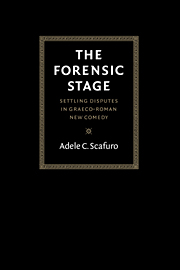Book contents
- Frontmatter
- Contents
- Preface
- Author's note on terminology, transliteration, translation, and texts
- List of abbreviations
- Introduction
- PART I PRE-TRIAL PLAYS
- PART II RECONCILIATION AND ITS RHETORIC
- PART III PLAYING ON THE BOUNDARIES OF THE LAW
- APPENDICES
- 1 Official arbitration in the Attic orators
- 2 Private arbitrations and reconciliations in Athens
- 3 Remedies for enslavement, kidnapping, and slave stealing in Athens and Rome
- 4 Controversial summonses in Rudens and Persa
- 5 Threats of lawsuits and self-help remedies in Graeco-Roman New Comedy
- 6 Ambiguous arbitri in Roman Comedy
- 7 Moikhos and moikheia
- Works cited
- General index
- Index locorum
7 - Moikhos and moikheia
Published online by Cambridge University Press: 03 March 2010
- Frontmatter
- Contents
- Preface
- Author's note on terminology, transliteration, translation, and texts
- List of abbreviations
- Introduction
- PART I PRE-TRIAL PLAYS
- PART II RECONCILIATION AND ITS RHETORIC
- PART III PLAYING ON THE BOUNDARIES OF THE LAW
- APPENDICES
- 1 Official arbitration in the Attic orators
- 2 Private arbitrations and reconciliations in Athens
- 3 Remedies for enslavement, kidnapping, and slave stealing in Athens and Rome
- 4 Controversial summonses in Rudens and Persa
- 5 Threats of lawsuits and self-help remedies in Graeco-Roman New Comedy
- 6 Ambiguous arbitri in Roman Comedy
- 7 Moikhos and moikheia
- Works cited
- General index
- Index locorum
Summary
MOIKHOS AS FORNICATOR IN TECHNICAL AND NON-TECHNICAL LITERARY USAGE
In chapter 5.1.a, evidence was adduced to demonstrate that fourth-century authors who allude to the homicide law and to other self-help remedies sometimes use moikhos as a technical or quasi-technical term to designate the sexual offender. In some passages the moikhos is identifiable as an adulterer, in others, he is a fornicator (i.e. a seducer of an unmarried woman). It will be instructive here to reflect on the technical or quasi-technical usage of moikhos against the background of more general usage in the fourth century.
When the moikhos appears in fourth-century Athenian literature and where the status of his partner or victim is identifiable, he is usually an adulterer. It has been pointed out, for example, that when Aristophanic characters speak of moikhoi, or when Aristotle discusses moikheia, adultery is the consistent, if not exclusive, focus of attention. That observation is of great significance, but it does not compel us to eradicate the moikhos as fornicator (i.e. “seducer of unmarried women”) from Athenian history. Here we shall broaden our purview to literature from the late fifth through third century.
- Type
- Chapter
- Information
- The Forensic StageSettling Disputes in Graeco-Roman New Comedy, pp. 474 - 479Publisher: Cambridge University PressPrint publication year: 1997



